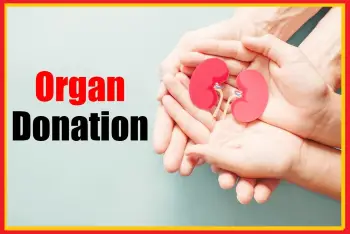India Launches National Organ Donation Registry to Boost Transparency and Save Lives
New Delhi, July 13, 2025 —The Ministry of Health and Family Welfare has officially launched the National Organ Donation Registry. This is a centralized system, designed to streamline the organ transplants and improve transparency in organ allocation across the country.
Union Health Minister Dr. Mansukh Mandaviya announced that the aim of National Organ Donation Registry is to bridge the critical gap between organ donors and recipients. This registry will ensure faster, fairer, and more efficient matching regardless of geographic location or hospital affiliation.
Requirement of National Organ Donation Registry:
According to official health record, nearly 5 lakh people require life-saving organ transplants each year. Due to delay, miscommunication, and lack of a unified system only a fraction of patients receive the organs on time and India faces countless preventable deaths.
The new National Organ Donation Registry aims to tackle these challenges head-on by:
- Creating a single national database of organ donors and recipients.
- Ensuring real-time organ availability updates across states.
- Preventing duplicate entries and black-market exploitation.
- Making allocation purely based on medical urgency, compatibility, and waiting time.
Functioning of National Organ Donation Registry:
The centralized platform will be integrated with state-level transplant bodies, government and private hospitals, and organ banks. Once a donor is registered, their information is securely stored and made accessible to authorized transplant coordinators nationwide.
For recipients, the National Organ Donation Registry allows for real-time matching based on blood type, medical compatibility, and proximity. The system is also designed to minimize organ wastage and enhance post-operative monitoring and reporting.
Vision for a Transparent Transplant Ecosystem
During the launch event of this Transplant Ecosystem Health Minister Mandaviya said that “This is not just a technical upgrade but it’s a life-saving revolution.” He further stated that “The National Organ Donation Registry will create public trust, improve coordination, and encourage more Indians to step forward as donors.” He also emphasized the need for awareness campaigns and education initiatives to break the social stigma around organ donation, especially in rural areas.
Procedure For Registration
National Organ Donation Registry is a part of Ayushman Bharat Digital Mission, which seeks to digitize India’s healthcare ecosystem. Citizens can now register as donors via a mobile app or through the National Health Portal using their ABHA (Ayushman Bharat Health Account) ID.
This digital integration also allows users to track donor pledges, receive notifications on transplant waitlists, and access post-donation health support.

Public Reaction and Next Steps
The launch of the National Organ Donation Registry has been widely welcomed by healthcare professionals, NGOs, and patient advocacy groups. Experts believe this move will help India close the gap with countries like Spain and the U.S., which have some of the highest organ donation rates globally.
The government has also announced the formation of a National Task Force to monitor the system, address ethical concerns, and ensure compliance with international transplant guidelines.
Conclusion
The National Organ Donation Registry marks a major milestone in India’s public health journey. By prioritizing transparency, digital coordination, and equitable access, the initiative has the potential to save thousands of lives each year and foster a culture of compassion, generosity, and medical integrity.
As India steps into a future powered by digital health, this registry is a clear example of digital innovation, good governance, and a commitment to human dignity can come together to drive a big change in the society.
FAQs on the National Organ Donation Registry
What is the National Organ Donation Registry?
The National Organ Donation Registry is a centralized digital platform launched by India’s Health Ministry to manage and streamline organ donation and transplant processes across the country.
Why did India launch this registry?
The registry was created to improve transparency, eliminate organ allocation delays, reduce black-market risks, and ensure fair and efficient matching between donors and recipients.
Who can register as an organ donor?
Any Indian citizen aged 18 and above can voluntarily register as an organ donor through the National Health Portal or the ABHA (Ayushman Bharat Health Account) app.
How does the registry benefit organ transplant patients?
It allows for real-time organ availability tracking, quicker matches, reduced waiting times, and a transparent, centralized list of eligible recipients based on medical urgency and compatibility.
Is the registry integrated with hospitals and organ banks?
Yes. The registry connects with public and private hospitals, regional organ transplant bodies, and authorized organ banks to ensure nationwide coordination.
Is my personal data safe if I register?
Yes. The registry is designed with strict privacy safeguards and encrypted data protocols. Only authorized transplant coordinators and healthcare institutions can access your information.
What organs can be donated through this system?
The registry supports donations of vital organs like kidneys, liver, heart, lungs, pancreas, and tissues such as corneas and skin.
Is organ donation allowed after death?
Absolutely. Many organ donations happen after a person is declared brain-dead. Family consent is often required unless the person has already pledged to donate via the registry.
Can I change or cancel my donor status after registering?
Yes. Registrants can update or withdraw their consent at any time through their ABHA-linked account or by contacting the Health Ministry’s official helpline.
How will this registry impact India’s organ donation rate?
Experts believe the National Organ Donation Registry will significantly increase donation rates by promoting trust, reducing administrative delays, and improving nationwide awareness.




